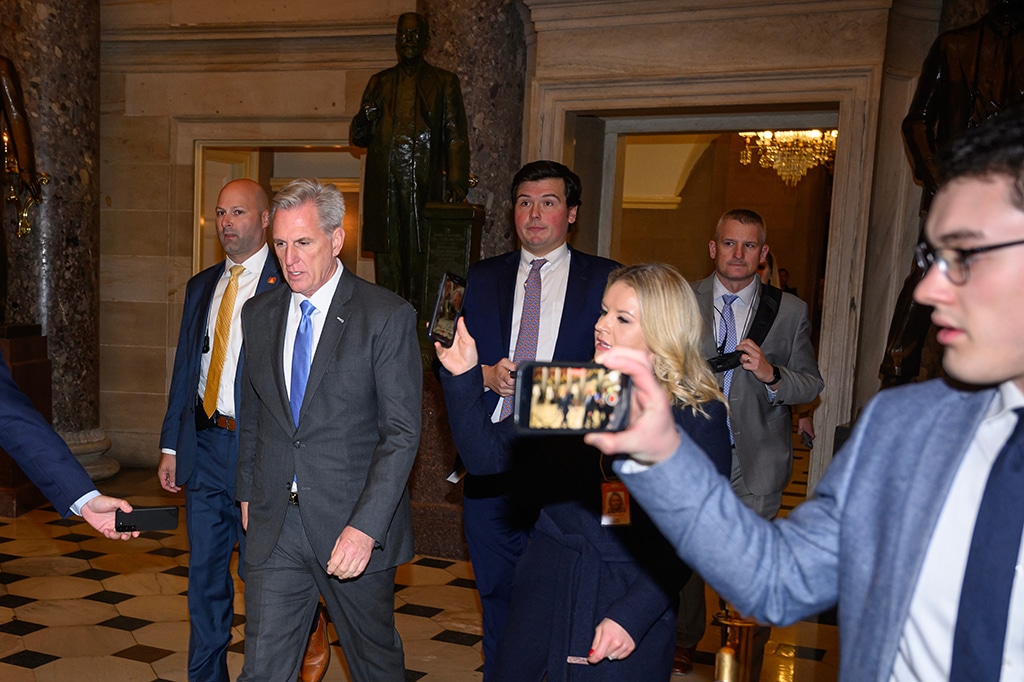WASHINGTON: Divisive new Speaker Kevin McCarthy passed the first test of his ability to lead the chaotic US House of Representatives Monday as lawmakers approved a rules package determining how his Republicans will govern. The vote on the blueprint -- described by top Democrat Jim McGovern as a "ransom note to America from the extreme right" -- came on the heels of one of the most turbulent weeks ever in the lower chamber of Congress.
Lawmakers almost came to blows in the newly Republican-controlled House as McCarthy was forced to go through 15 rounds of voting over four days to overcome a far right blockade to his candidacy. "At the heart of all of this discussion last week it was very clear, surely from our side, that Washington is broken," McCarthy's deputy, Majority Leader Steve Scalise, said as the debate opened.
"And not just is Washington broken, but the way that this House has been running for the last few years has not been designed to address the problems of the people from across this country." Democrats complain, however, that the deals McCarthy cut to win the speaker vote have severely curtailed the role of Washington's top legislator and have ceded power to the most extreme Republicans.
The publicly available 55-page rules package lays out Republican priorities for the remainder of Democratic President Joe Biden's term and the operating procedures the party will adopt. One of the headline measures is a panel to investigate the "weaponization of government" that is expected to zero in on the Justice Department's investigations into former president Donald Trump.
Much of the package is boilerplate conservative politics such as provisions forcing lawmakers to cover increased spending with cuts elsewhere rather than new taxes. But it also allows a single member of either party to force a vote to oust the speaker, an insurance policy that right-wingers will use to hold McCarthy's feet to the fire.
And it requires the House to bring to the floor a variety of right wing priorities, with a vote later Monday on canceling more than $70 billion in extra funding agreed for the Internal Revenue Service passing along party lines. The repeal has no chance of being rubber-stamped by the Democratic-led Senate, however. The White House said Biden would veto the "reckless" legislation in any case, which it argued would add nearly $115 billion to the deficit over a decade by "enabling wealthy tax cheats."
'Horrible idea'
McCarthy could only afford to lose four of his lawmakers at most, with every Democrat voting against the rules package, but it passed by 220 votes to 213 as only one Republican voted no. Yet McCarthy's most controversial concessions remain clouded in mystery, as they were negotiated off the books with the far right House Freedom Caucus and weren't in the official package.
"We don't know what (conservatives) got or didn't get. We haven't seen it," South Carolina congresswoman Nancy Mace told CBS on Sunday. "We don't have any idea what promises were made or what gentleman's handshakes were made."
McCarthy has agreed for example to give the Freedom Caucus outsized sway over the day-to-day handling of legislation, according to US media, ceding significant leadership powers to the right flank. Even more controversial is a pledge for talks with conservatives on taking up a 10-year budget that freezes spending at 2022 levels.
This would mean slashed funding for federal agencies -- and a likely 10 percent decrease in defense spending that Texas Republican Tony Gonzales, the only Republican "no" vote on the rules package, called a "horrible idea." The cuts would delight many fiscal conservatives but, again, are largely symbolic since they would be dead on arrival in the Senate. - AFP











